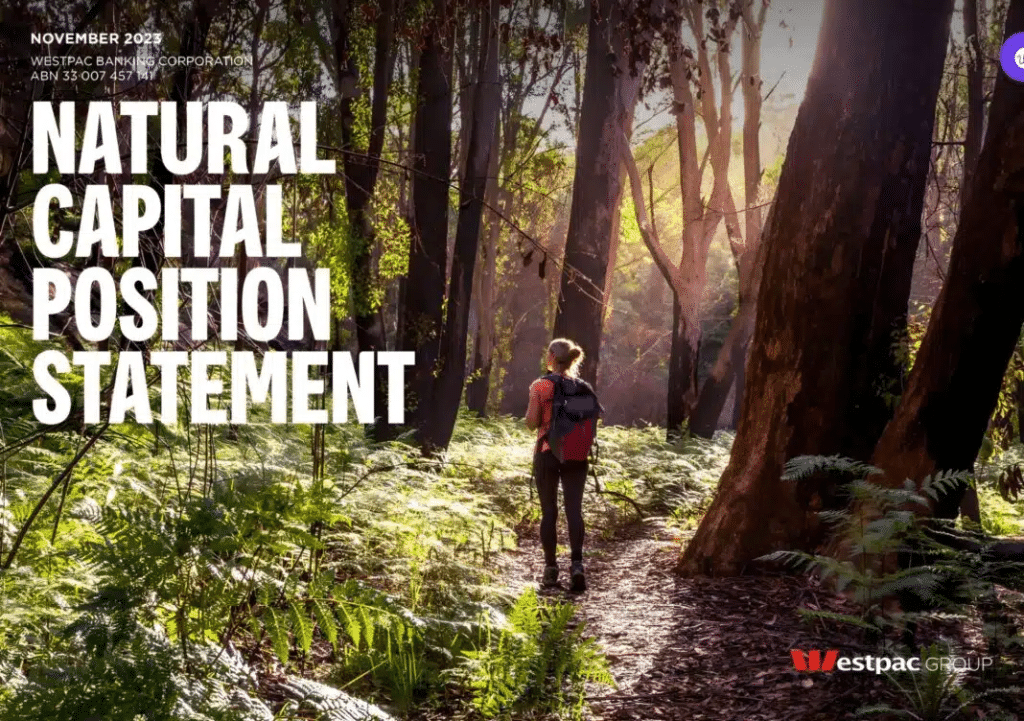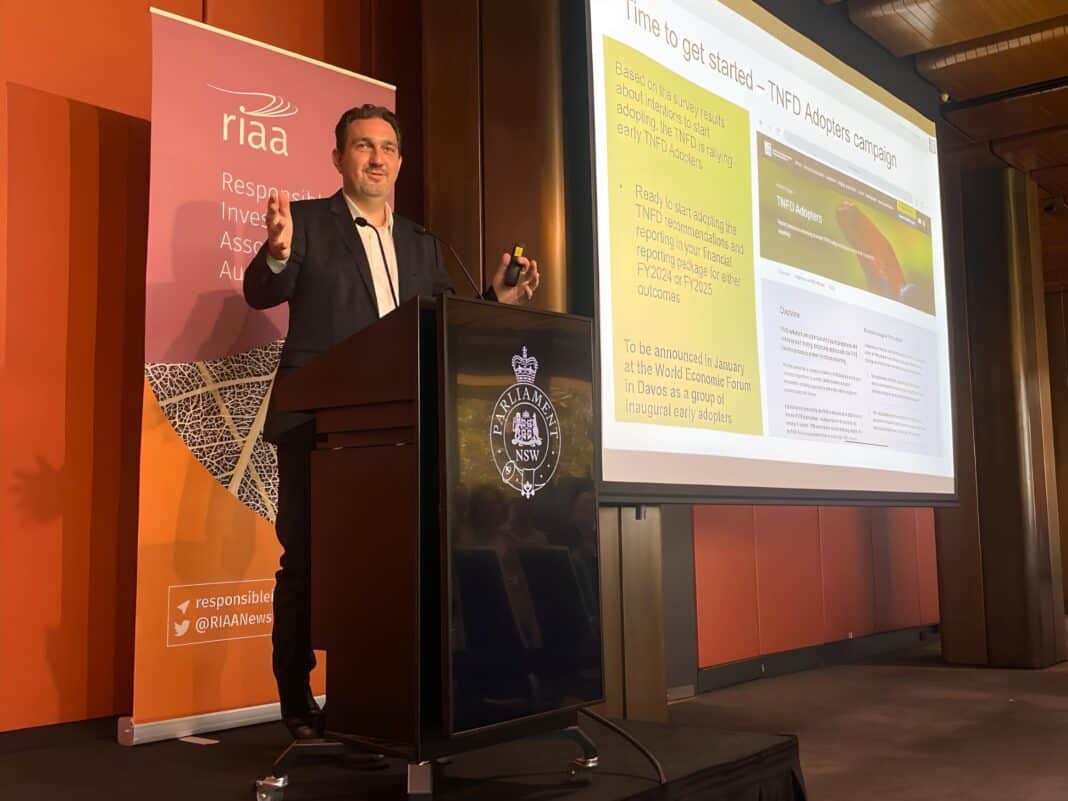The push to embrace new “nature-positive” financial frameworks is gaining momentum, with more than 200 representatives from Australia’s ESG community attending the formal launch of the Australasian TNFD framework on Monday night.
The movement, which has the backing of the Australian government – a strategic funding partner and member of its Stewardship Council – has seen significant commitments already made by Australia’s largest financial institutions that want real action on the environment.
In September, Wood Central reported that Australia’s Big Four Banks, Macquarie, and 40 of the world’s largest financial institutions are behind a push to establish the Taskforce on Natural Related Financial Disclosure (TFND), which uses green finance to end deforestation, land clearing, biodiversity and conservation.

Westpac, Australia’s second-largest merchant bank by deposits, has already released a nature-positive statement, a move backed by the Australian Conservation Foundation (ACF), which hopefully “drives a wave of zero-deforestation commitments across the banking sector.”
According to Estelle Parker, Responsible Investment Association of Australia (RIAA) co-CEO, interest in understanding nature-related risks, opportunities, dependencies and impacts in Australia and New Zealand started in the investor community two years ago.
Speaking in Sydney at the launch, Ms Parker said, “RIAA (which coordinates the TFND in Australia and New Zealand) represents 75 per cent of managed funds in Australia” and has “seen investors more and more demanding consistent information to inform decision-making.”
In recent months, Australia’s merchant banks have taken a stronger stance against native forest harvesting, with Wood Central reporting that the Bendigo Bank “will not provide finance to projects or large-scale electricity generation” in several sectors, including native forest logging and coal, coal seam gas, crude oil and natural gas.
The Bendigo Bank, Australia’s 7th largest merchant bank, is the first major institution to introduce a total ban on native forest logging as part of its “Climate Change Policy”, a move which has significant implications for the viability of hardwood logging and processing.
In May, the Wood Central Publisher reported that the forestry industry, absent in discussions around ESG and nature-positive commitments, must improve its communication and value proposition to the financial sector.
“The forestry sector, despite its significant contribution to sustainability, found itself underrepresented in the discussions,” the publisher said, who attended the RIAA National Conference in Melbourne.
“This shows the need for the industry to communicate its role in the sustainability transition more effectively. The industry needs to articulate better the benefits of carbon sequestration and the production of carbon-dense products.”
Behind Finance, Mining and Agriculture drive ESG discussion
According to Ms Parker, the mining, construction, infrastructure, manufacturing, retail and government (in that order) are driving the push towards ESG.
“[TNFD] will situate Australia and New Zealand at the forefront in the global economic race to attract capital increasingly cognisant of sustainability issues’ impacts on returns. We’ve also seen the release of legal opinions in Australia and New Zealand highlighting that considering nature risk is part of the company director’s fiduciary duty,” she told attendees at the framework launch.
“Let’s not kid ourselves. Measuring nature is hard, and disclosing impacts will reveal some uncomfortable truths about the effects of the company’s operations on our unique and very fragile biodiversity. But understanding risks, dependencies, opportunities, and impacts will strengthen the company’s ability to address the risks and harness the opportunities.”
Tanya Plibersek, Australia’s Minister for Environment and Water, is a strong backer of a nature-positive financial system, sending a video to launch which emphasised the government’s willingness “to incorporate (nature-positive considerations) in future decision making.”
Ms Plibersek, currently drafting the country’s new Nature Positive Laws, is a signatory of the COP15’s “Global Biodiversity Framework”, which will see the Australian government boost current conservation areas from 22% to 30% through the establishment of protected areas (PAs) and other area-based conservation measures (OECMs).
Tony Goldner, the Executive Director of the TFND, believes Australian organisations have extra incentive to start working with the framework, noting that while globally, six of the nine planetary boundaries have been exceeded, in Australia, we’ve exceeded eight of the nine.
“So if there’s ever a place in which there’s a case for urgent action or getting on with this work, it’s got to be Australia,” he told the Fifth Estate yesterday.
Australia is an OECD country, meaning “we’re rich, we’re developed, we’ve got amazing data platforms, we’ve got incredible science capabilities, we’ve got a very sophisticated finance sector,” before adding that Australia is also one of the world’s 17 megadiverse countries.
“If you do a Venn diagram, and you look at the countries that are both OECD and megadiverse, there’s only two: the United States and Australia, and we know how hard it is to progress on these issues right now in the US.”
He said this leaves a unique opportunity for Australia to lead, both as an imperative and an opportunity, especially in finance and the “incredible scientific talent we have”, to be at the forefront of scaling solutions to global challenges.
“The whole global economy is dependent on nature. So our expectations as investors, as superfund holders, pension and investment managers, investment owners – all depends on the valuation of cash flows, and those cash flows sit on top of these flows that we haven’t been valuing into business,” he told the Fifth Estate.
But science tells us that the fragility of nature and the declining resilience of ecosystems are heading in the opposite direction of investor expectations and super funds.
“It’s obvious now that nature risk is financial risk.”
Next steps
The next step for the TFND task force is to get feedback on their eight sector-specific guidance documents, which include the following:
- oil & gas
- metals & mining
- forestry & paper
- food & agriculture
- electric utilities & power generators
- chemicals
- biotechnology & pharmaceuticals
- and aquaculture.
It is also working on a global nature data facility to connect datasets and provide an open-access platform and a range of capacity-building initiatives.
Overall, however, a shift in perspective is most needed.
“Nature as a corporate risk and opportunity issue is a very new domain,” Mr Goldner said.
He said companies that ask how their business depends on nature will create a position of competitive advantage and be more resilient in the face of the science that the frequency and severity of nature-related events are increasing.
“Those who are slow to move are likely to be caught out by shifting perceptions and information needs of their capital and insurance providers, which could convert into costs to their business.”
“Discloser is just one tool. The bigger priority is to shift the mindset around the relationship between nature and business.”






